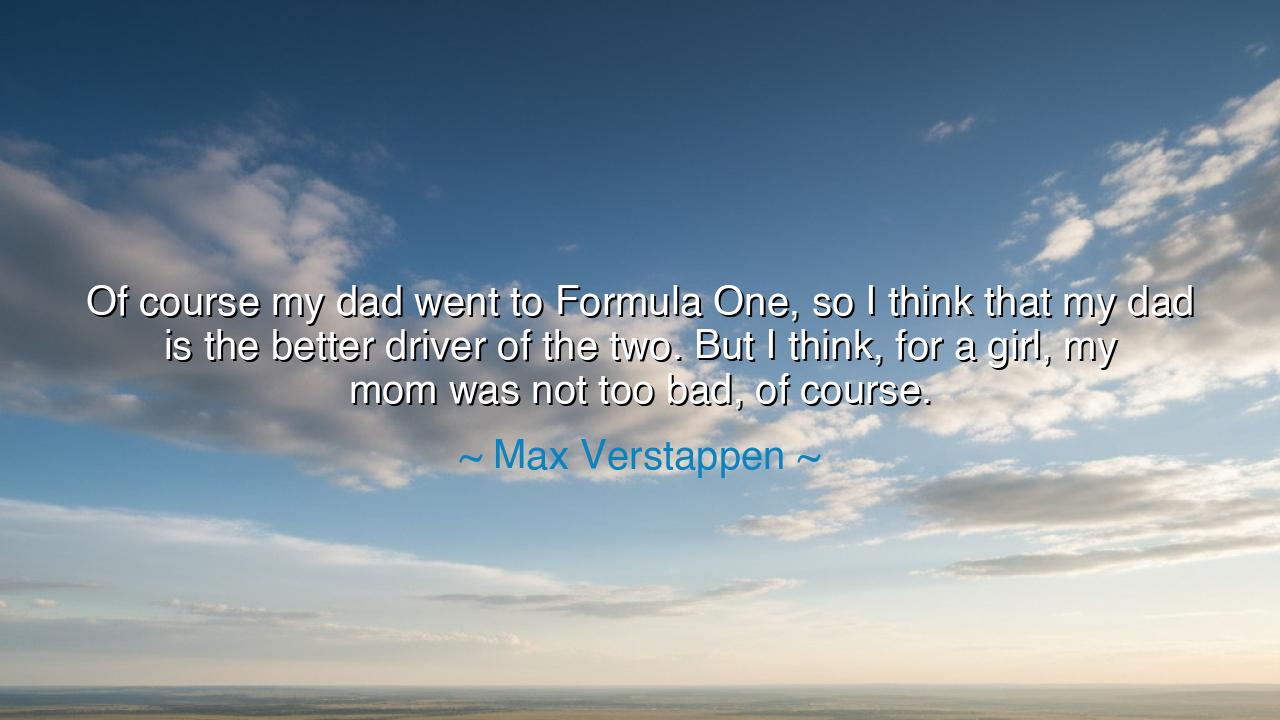
Of course my dad went to Formula One, so I think that my dad is
Of course my dad went to Formula One, so I think that my dad is the better driver of the two. But I think, for a girl, my mom was not too bad, of course.






The words “Of course my dad went to Formula One, so I think that my dad is the better driver of the two. But I think, for a girl, my mom was not too bad, of course,” spoken by Max Verstappen, are more than the lighthearted remark of a champion; they are a reflection of heritage, admiration, and the forging of identity through family. Beneath their humor lies the deep current of a truth the ancients knew well — that greatness is not born in isolation, but from the lineage of those who came before. Verstappen’s words reveal the eternal chain of influence — from father to son, from mother to child — that shapes every destiny. His acknowledgment is both playful and reverent, a son’s tribute to the two forces that steered his life: the discipline of his father and the quiet strength of his mother.
When Verstappen speaks of his father, Jos Verstappen, as the “better driver,” he is not merely comparing skill but honoring experience and legacy. His father’s hands once held the same steering wheel, his eyes once measured the same corners of the racetrack. Jos’s career in Formula One was not gilded with the same victories his son would one day claim, but it laid the foundation of knowledge, discipline, and hunger that would forge a champion. This, too, is an ancient story — the story of fathers who carve paths that their sons complete. Just as Philip of Macedon prepared the ground upon which Alexander the Great would build an empire, Jos prepared the crucible in which Max’s fiery will would be tested and refined. The father’s craft becomes the son’s inheritance, and through that inheritance, the family name ascends.
Yet in the same breath, Verstappen turns to his mother, Sophie Kumpen, with a tone both tender and admiring. His phrase — “for a girl, my mom was not too bad” — though spoken with the casual humor of youth, carries an undertone of deep respect. Sophie herself was a formidable racer, competing in karting against some of the greatest drivers of her generation. In her, Max saw not merely a mother, but the embodiment of grace under pressure, the calm precision that balances the wild hunger for victory. It is no small thing that the one who nurtured him also taught him how to compete. She was the steady flame, the counterpart to his father’s forge. Thus, his parents together represent the twin forces that guide all greatness — passion and patience, fire and restraint, ambition and empathy.
The ancients would have recognized in this family the eternal triad of mentorship: inheritance, discipline, and inspiration. Just as the sculptor’s chisel sharpens the form within the stone, so did Verstappen’s upbringing carve his potential into mastery. His father’s relentless training pushed him beyond limits; his mother’s belief softened the hardness of ambition with understanding. Between the two, he inherited not just skill, but balance — the balance that allows one to rule the race, not by fury, but by control. His quote, though spoken with humor, conceals a truth about human excellence: that it is born where rigor meets love, and where inheritance meets gratitude.
Consider the tale of Leonardo da Vinci, whose genius was shaped by both the rigor of technical apprenticeship and the gentle encouragement of imagination. Like Verstappen, Leonardo’s mastery came not from one influence alone, but from the harmony of opposites — the scientific and the spiritual, the masculine and the feminine. In every great creation, there is this union of energies. Verstappen’s own success reflects this principle: his driving is ferocious yet fluid, relentless yet precise. Behind every champion stands not a single mentor, but a constellation of influences — and behind his, stand two.
There is also humility in Verstappen’s tone. Though he has conquered the world of Formula One, he speaks not as a god of the sport, but as a son remembering his roots. In doing so, he teaches the wisdom of gratitude — that no victory is fully one’s own. The ancients taught that the greatest heroes, even at the height of glory, must look back to the hands that lifted them from the earth. Achilles had his mother, Thetis; Alexander had his father, Philip; and Max, his Jos and Sophie. To forget the soil from which we sprang is to lose the strength that nourishes us. To remember it is to honor the sacred chain that binds generations together.
So let us take from Verstappen’s words this timeless lesson: honor the sources of your strength. Whether it is a parent, a teacher, or a humble beginning, never forget those who gave shape to your journey. Laugh as Max laughed, but remember as he remembered — that greatness is not self-made, but family-forged. Be proud of your victories, yet humble in their origins. For the race of life, like the race of champions, is not run alone. It is carried forward by the spirit of those who came before, and guided by the unseen hands that once steadied your own. And in that truth lies the deepest wisdom: that behind every master, there are those who first taught him how to drive.






AAdministratorAdministrator
Welcome, honored guests. Please leave a comment, we will respond soon